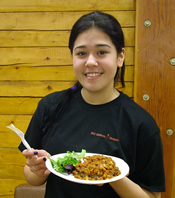Program for rural nutrition education receives $1 million
Program for rural nutrition education receives $1 million
Submitted by Carla Browning
Phone: 907-474-7778
04/14/08

Download photo
The University of Alaska Fairbanks Interior-Aleutians campus has received a $1 million, three-year grant for nutrition education in rural Alaska.
The Troth Yeddha’ Nutrition Program will combine education and outreach for community collaboration aimed at improving the health of Alaska Native peoples, a population at increased risk for the development of obesity and other health-related challenges.
"What we’re going to be doing is offering for credit courses," said Sarah McConnell the program’s coordinator. "Embedded in each course is an outreach component, so the students become the outreach team."
The program, actively recruiting students for fall 2008, will offer up to 12 credits in nutrition-related courses for degree-seeking students. This area of concentration may also attract health aides, teacher aides or early childhood and food service professionals interested in integrating nutrition into their current positions. A full-time, registered dietitian has been hired to provide nutrition expertise.
Learning more about making healthier food choices is something McConnell has experienced first-hand since she began working with dietitians to develop the program. She’s lost more than 40 lbs. in the last two years.
"This stuff really works," said McConnell. "It helped me to break the code. The information I was getting "¦worked as a secret decoder ring to help me make healthier choices about what I ate and how activity played a role."
The grant will focus on getting similar information to people in rural Alaska where traditional foods have, in many homes, been replaced with convenient snacks and highly processed staples. And although healthy foods can be more difficult to find in rural areas, the intent is to have students working in their home communities to develop culturally appropriate educational materials that would include information about the benefits of traditional foods. For example, most dietary recommendations don’t include subsistence meats and wild berries, which can provide nutrients and health benefits.
The grant is funded through the U.S. Department of Agriculture, Cooperative State Research Education and Extension Service and the National Research Initiative, Human Nutrition and Obesity Program.


